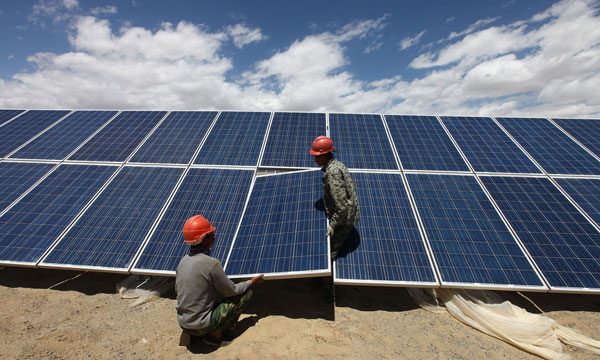Editor's note: This article is run by the Guardian, which, together with China Daily and other 32 global media, forms Climate Publishers Network.
A study shows people are more likely to support climate action if they know about the many extra benefits of doing so.
 |
|
Workers install a solar panel at a photovoltaic power station in Aleteng village, northwest China. Job creation is an example of an economic co-benefit of tackling climate change. Photograph: REX/Imaginechina/REX/Imaginechina |
A new paper published in the journal Nature Climate Change provides encouragement that people can be motivated to act on climate change. The title of the paper is, "Co-benefits of Addressing Climate Change can Motivate Action Around the World." Lead author Dr. Paul Bain and his colleagues wanted to know if emphasizing co-benefits when talking about climate change would motivate people to take action. They found that in many cases, the answer is yes.
First of all, what are co-benefits? Pulitzer Prize-winning cartoonist Joel Pett provided some good examples in this cartoon.
Let's say that you design a city so that there are green spaces and parks in a hope that you will reduce pollution. You might find out that the green spaces and parks cool the city, provide places of recreation and exercise, and generally improve the quality of life beyond merely pollution. These would be called co-benefits; they are extra benefits you get from your action.
The authors of this new study surveyed more than 6,000 people in 24 different countries to find out whether emphasizing co-benefits would make people more likely to act on climate. They classified co-benefits into four categories: development, benevolence, dysfunction, and competence.
Economic development is an example of a potential development co-benefit. For instance, installing wind turbines would lower greenhouse gas emissions and create jobs (jobs are a co-benefit). Benevolence relates to the how caring and moral people are in society and competence relates to whether people are skilled and/or capable. Dysfunction deals with negative effects such as pollution and disease. For instance, decreased disease and airborne pollution are a co-benefits.
The authors then asked how these co-benefits would influence peoples' motivation to act on climate. People can act in a variety of ways, through citizenship (public action or voting for instance); they can act through personal choices (using energy more wisely, purchasing clean energy for example); or by donating to non-polluting causes and organizations.
When the authors reviewed the results of the surface, they found a consistent story. Motivations to act on climate change were clearly related to beliefs about co-benefits, especially for economic and scientific development (development co-benefit) and for building a more caring community (benevolence co-benefit).
So, how can this information be used? The authors wrote,
"Communicating climate science and co-benefits of action should be complementary, not competing, strategies ... Crucially, addressing co-benefits can motivate action independently of views about climate change importance, even for those unconvinced climate change is real."
When I communicated with Dr. Bain for further comment, he responded,
"Our research shows that some co-benefits of addressing climate change can motivate public support and action around the world. Critically, the influence of these co-benefits did not depend on believing climate change is real or important or people's political ideology, showing the potential of co-benefits in overcoming ideological hurdles that are currently holding back widespread action. This can help in targeting climate change policies and communication more effectively, so that climate change initiatives can not only address climate change but also achieve the broader social benefits people value."